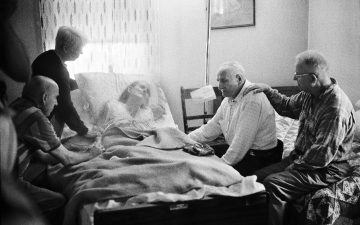Anita Ho in Aeon:
 ‘I wouldn’t show them the note,’ a retired nurse, told my mother. It was a request to meet with my father’s physicians. He had undergone a cardiac surgery, and soon after became lethargic and difficult to rouse. The nurses thought he was simply fatigued from his procedure, and my mother didn’t want to question their professional judgment. Two days later, my father suffered an acute respiratory failure and was rushed to the intensive care unit (ICU). He was intubated and remained dependent on a respirator for days. The nurses told my mother that the doctors were considering a tracheostomy, but up to that point no ICU physician (called an ‘intensivist’) had so much as talked to my family.
‘I wouldn’t show them the note,’ a retired nurse, told my mother. It was a request to meet with my father’s physicians. He had undergone a cardiac surgery, and soon after became lethargic and difficult to rouse. The nurses thought he was simply fatigued from his procedure, and my mother didn’t want to question their professional judgment. Two days later, my father suffered an acute respiratory failure and was rushed to the intensive care unit (ICU). He was intubated and remained dependent on a respirator for days. The nurses told my mother that the doctors were considering a tracheostomy, but up to that point no ICU physician (called an ‘intensivist’) had so much as talked to my family.
Intensivists were not at the bedside during the limited visiting hours and, as they rotated, a series of different intensivists attended to my father. So my mother was left to wait outside the ICU in the remote chance that she would run into my father’s doctor, but nobody told her the name of the attending physician du jour, and the doctors’ faces were often hidden behind surgical masks as they walked the halls. So, with my help, she had drawn up the note, requesting a meeting. But it was to no avail. ‘The doctors might think your family is difficult,’ the nurse said.
I wondered why the doctors didn’t hold a family meeting to discuss my father’s prognosis and clinical options. While my mother wanted to speak to at least one of the intensivists, attempts to make appointments were met with reluctance. The nurses said the doctors were busy, that they had to uphold patient privacy and confidentiality. My mother started to blame herself for not insisting on further investigation regarding my father’s lethargy, and she was anxious about the lack of information. Worse, the insinuation that she would be bothering the busy clinicians for wanting a meeting with them intimidated her. She was sternly warned by a nurse not to overstay the visiting hours. I am a bioethicist who has worked alongside clinicians in supporting patients and families making complex and rending care decisions. I have seen how physicians are bombarded with demands. Meeting with families requires not only coordination but energy: it is emotionally draining for clinicians to share grim prognoses with patients and families.
More here.
